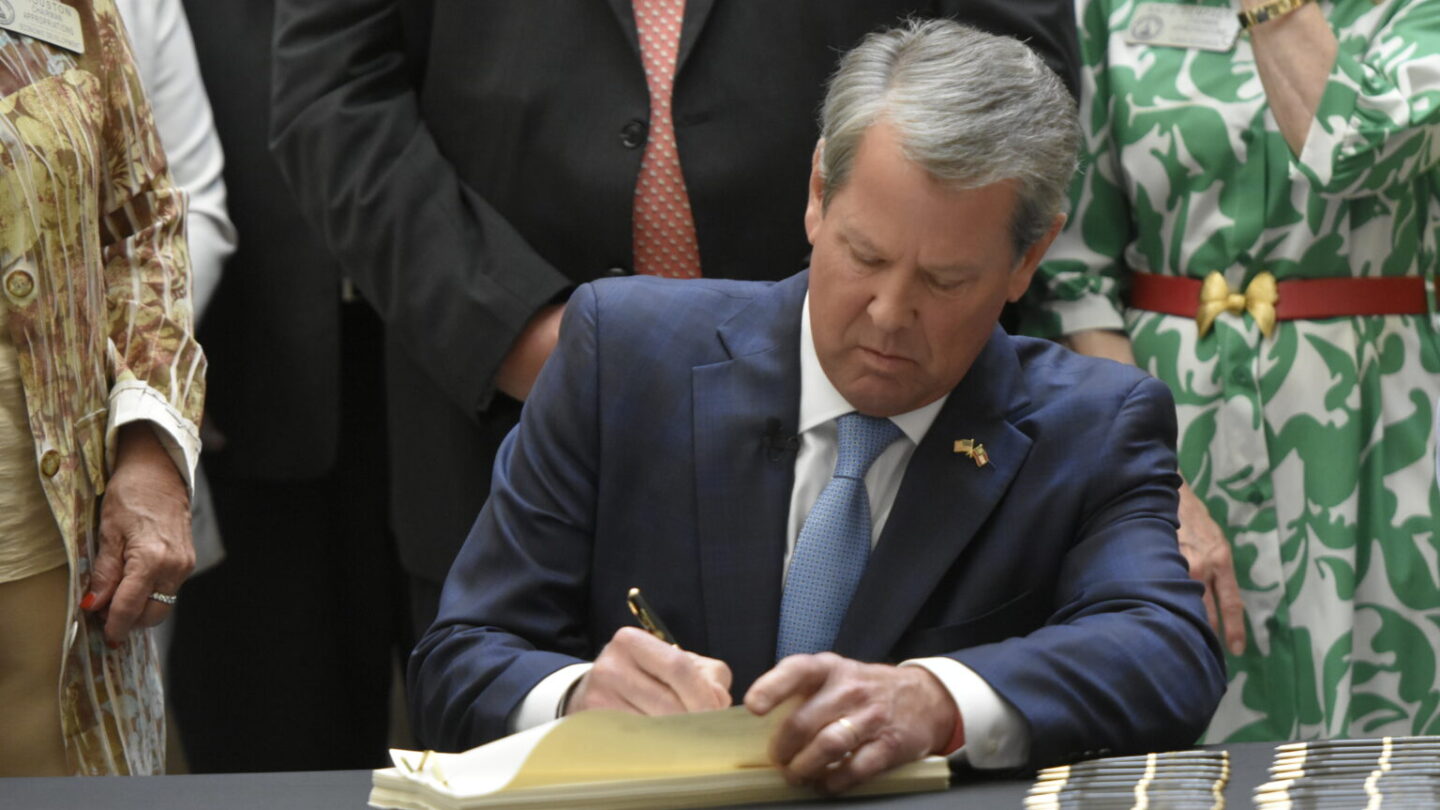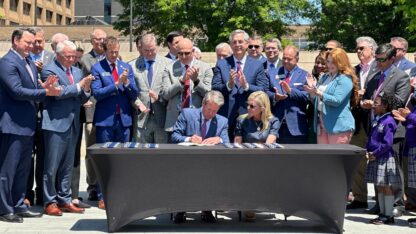Georgia Gov. Brian Kemp has vetoed a bill that would have suspended a tax break for data centers for two years, saying it would undermine the business community.
The bill was pitched as a pause that would allow the state to assess the impact these massive energy consumers have on the grid. The state’s largest utility, Georgia Power, plans to lean on fossil fuel sources to make up the energy shortfall partially caused by these data centers.
The measure would have applied to new applications for a state sales tax exemption as of July 1, and it would have left the perk’s future in the hands of a new special commission on data center energy planning.
That proposal narrowly passed both chambers during the 2024 legislative session, drawing bipartisan opposition from lawmakers with data centers back home and Democrats responding to concerns from labor unions.
In a statement, Kemp argued state lawmakers extended the sales tax exemption for another three years just two years ago.
“The bill’s language would prevent the issuance of exemption certificates after an abrupt July 1, 2024 deadline for many customers of projects that are already in development — undermining the investments made by high-technology data center operators, customers, and other stakeholders in reliance on the recent extension, and inhibiting important infrastructure and job development,” Kemp said in the statement.
Environmental groups were dismayed by the veto.
“The surge in the demand for power from data centers is propping up old coal plants and causing a rush to build new gas infrastructure,” said Sierra Club Georgia Chapter Director G Webber. “As a result, Georgia communities will see higher levels of air and water pollution, and our fight to curb the worst effects of climate change is hampered.
“Kemp is burying his head in the sand by refusing to address an issue already having such a significant impact on our state,” Webber added.
A group of environmental groups had pressed the governor to sign the bill, sending him a letter last month that argued the measure represented reasonable steps to prepare for the impact of these data centers.
“Giving data centers a tax break without investigating their impact on our environment and billpayers is short sighted,” said Jennette Gayer, executive director of Environment Georgia. “I hope we can revisit this issue in the next legislative session.”
The bill was one of a dozen struck down by Kemp Tuesday on the final day for the governor to sign a bill into law.
Clerical error?
The governor also vetoed a bill that would have increased the homestead exemption, seemingly over a last-minute error in the lawmaking.
The version that passed the House would have raised the statewide homestead tax exemption from $2,000 to $4,000. But state senators increased the amount to $10,000 in committee, only to switch back to the original amount on the floor.
The problem? The change must be approved by voters, and the language in the ballot text still included the Senate’s higher amount.
“Voters would therefore be approving a different exemption which the Legislature did not pass, while the statutory language would never receive the voter approval needed for it to take effect,” Kemp wrote in his veto statement.
It would have been the first adjustment of the homestead exemption since the late 1970s. The proposal was part of a slate of tax relief bills backed by the House speaker.
HOPE for graduate students
Kemp put the kibosh on a trio of bills intended to decrease the cost of a college education because he said lawmakers didn’t factor in costs to the state.
Atlanta Democrat Scott Holcomb’s HOPE Scholarship expansion would have allowed some recipients who still had money available after graduating to use the costs of those credit hours towards a professional or graduate degree.
House Bill 1231 passed the Senate unanimously and made it through the House on the last day of the legislative session with a 166-1 vote, with Dallas Republican Rep. Martin Momtahan the sole no vote.
But Kemp said students have left around 108,000 HOPE credit hours on the table, and if they were all to take advantage of those courses, it could cost the state more than $25 million.
“I was proud to restore the promise made long ago to Georgia’s students by fully funding the HOPE Scholarship in 2023,” he wrote. “To maintain that promise, and the financial support upon which it stands, we must only consider expansion with a full understanding of the effect it will have on available funds.”
Tuition grants for nurses
In the 2023-2024 school year, students at eligible private schools could get an extra $500 per semester or $333 per quarter to help pay their tuition thanks to the state’s Tuition Equalization Grant.
House Bill 228, sponsored by Rome Republican Rep. Katie Dempsey, aimed to expand that. Dempsey said her goal was to increase nursing capacity in the state by allowing students at private nursing programs that meet licensure exam passage rates and other standards to qualify for the grants.
The Senate amended the bill to further expand the benefits to other private college students, but Kemp said lawmakers didn’t put up the money to pay for the plan or come up with an estimated cost.
“Despite each of these programs having finite resources, the General Assembly proposed many ad hoc pieces of legislation to expand institution eligibility without additional funding or fiscal analysis addressing the impact of such expansion on current appropriations,” he wrote. “While I recognize the utility of tuition equalization grants for particular educational needs, the diversion of taxpayer funds to private institutions should only be sought on a measured and consistent basis.”
Trucks for troops
History repeated itself Tuesday when Kemp shot down a bill aimed at putting veteran backsides into truck cabs.
Dallas Republican Sen. Jason Anavitarte’s Senate Bill 203 aimed to help veterans find jobs after leaving the service by making Technical College System of Georgia commercial driver’s license training free for veterans.
Lawmakers in both chambers overwhelmingly approved the idea last year when it was part of House Bill 249, but Kemp vetoed it because he said they did not include funding for the program in the budget.
They did not fund the free lessons again this year, Kemp said in his veto statement.
“This proposal was previously included in House Bill 249, which I vetoed on the grounds that the General Assembly failed to fund the initiative. The General Assembly also failed to fund Senate Bill 203 this year,” Kemp wrote.
Kemp added that he supports veterans and encourages anyone hoping to get a CDL to look into “currently funded resources to cover tuition costs such as the Hope Career Grant.”
This story was provided by WABE content partner the Georgia Recorder.









